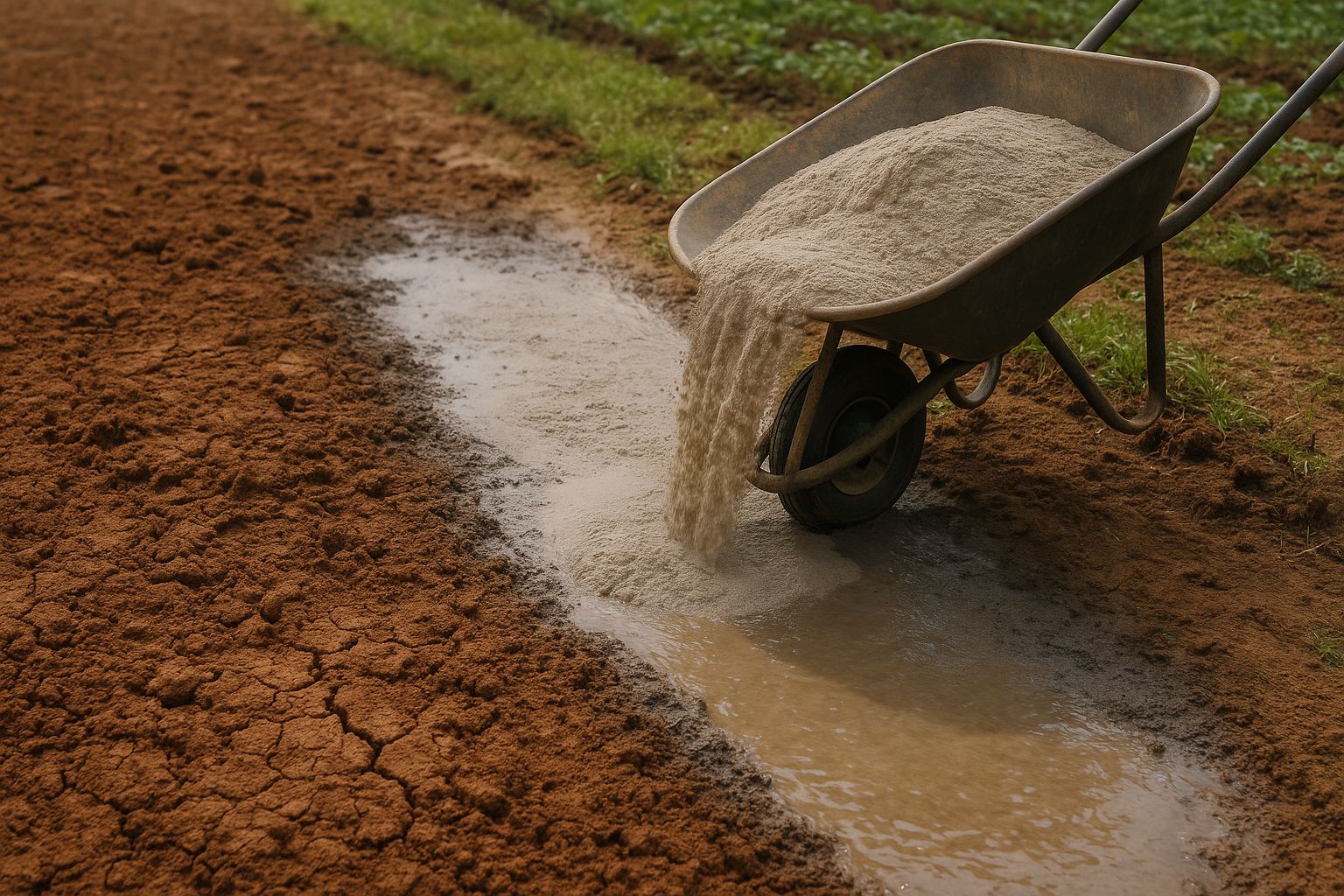Water scarcity affects millions of farmers worldwide, making efficient water management a critical concern for agricultural sustainability. Sodium bentonite for water retention offers a natural, cost-effective solution that can transform how soil manages moisture. This clay mineral has gained recognition as a powerful soil amendment that dramatically improves water-holding capacity while maintaining soil health.
The growing demand for sustainable farming practices has put sodium bentonite at the forefront of agricultural innovations. Research shows this remarkable mineral can increase soil water retention by up to 12% in surface layers, making it a game-changer for regions facing water stress and irregular rainfall patterns.
What Is Sodium Bentonite and How Does It Work?
Sodium bentonite is a natural clay mineral formed from volcanic ash that has weathered over millions of years. This mineral belongs to the montmorillonite group and possesses unique properties that make it exceptional for soil improvement. When exposed to water, sodium bentonite can expand to 15-20 times its original volume, creating a gel-like substance that holds moisture effectively.
The mineral’s structure consists of thin, plate-like particles with negative charges that attract and bind water molecules. This creates a network of interconnected pores that store water and release it slowly to plant roots. The swelling capacity of sodium bentonite makes it superior to other soil amendments in terms of water retention capabilities.
Commercial applications of sodium bentonite have proven successful across various soil types, particularly in sandy soils that struggle with water retention. The mineral works by creating physical barriers that slow water movement through soil layers, giving plant roots more time to absorb available moisture.
The Science Behind Water Retention Enhancement
Research conducted by scientific institutions demonstrates the measurable impact of sodium bentonite on soil water dynamics. Studies reveal that bentonite applications increase field water-holding capacity and plant-available water in the top 40 cm of soil, where most crop roots actively absorb nutrients and moisture.
The mechanism works through several processes:
Physical Water Binding: Sodium bentonite particles create microscopic reservoirs that trap water molecules between clay layers. This bound water remains accessible to plants during dry periods, providing a buffer against drought stress.
Improved Soil Structure: The mineral enhances soil aggregation by binding individual particles together, creating stable pore spaces that facilitate both water storage and air movement. This improved structure prevents waterlogging while maintaining adequate moisture levels.
Cation Exchange Capacity: Sodium bentonite increases the soil’s ability to hold nutrients by expanding the cation exchange capacity. This means improved nutrient retention alongside better water management, creating optimal growing conditions for crops.
Field trials show bentonite applications at rates as low as 10 tons per hectare can significantly increase soil water retention. Higher application rates of 20 tons per hectare provide even more substantial improvements in both water-holding capacity and nutrient retention.
Practical Applications for Different Soil Types
Sodium bentonite for water retention works most effectively in specific soil conditions. Sandy soils benefit tremendously from bentonite amendments because their naturally poor water-holding capacity improves dramatically with clay particle additions.
Sandy Soil Improvements
Sandy soils drain quickly and struggle to retain moisture for plant use. Adding sodium bentonite creates a balanced soil structure that combines drainage with water retention. Research indicates that sandy soils amended with bentonite show:
- 25% increase in water-holding capacity with 3% bentonite application
- Improved nutrient retention that reduces fertilizer requirements
- Better plant growth rates and crop yields
Clay Soil Modifications
While clay soils naturally retain water, they often become waterlogged and compacted. Sodium bentonite can actually improve drainage in heavy clay soils by creating better pore structure. The amendment helps break up dense clay layers while maintaining moisture availability.
Application Methods and Timing
Farmers typically apply sodium bentonite during soil preparation before planting. Broadcasting the clay material across fields and incorporating it through tillage ensures even distribution. Timing applications with organic matter additions maximizes the benefits for soil structure and water retention.
The mineral can also be applied through irrigation systems in certain cases, though broadcast applications followed by mechanical incorporation tend to provide more uniform results. Multiple smaller applications over time often prove more effective than single large applications.
Read More – Top 7 Ways GCL Bentonite Helps in Environmental Projects
Benefits Beyond Water Retention
Sodium bentonite provides additional advantages that make it valuable for comprehensive soil improvement. The mineral’s impact extends far beyond simple water management, creating cascading benefits throughout the soil ecosystem.
Microbial Activity Enhancement: Research shows that bentonite applications increase both microbial growth and diversity in soil. The improved water availability and soil structure create favorable conditions for beneficial bacteria and fungi that support plant health.
Temperature Regulation: Soils treated with sodium bentonite maintain more stable temperatures due to increased water content. This thermal buffering protects plant roots from extreme temperature fluctuations and extends growing seasons in marginal climates.
Erosion Prevention: The binding properties of sodium bentonite help hold soil particles together, reducing erosion from wind and water. This stabilization effect protects valuable topsoil and maintains field productivity over time.
Chemical Soil Health: Bentonite applications can help moderate soil pH levels and improve the availability of nutrients. The mineral’s cation exchange properties create a more balanced chemical environment for plant growth.
Studies indicate that crop yields can increase by up to 20% with proper bentonite application, making it an economically viable investment for farmers seeking sustainable production improvements.
Best Practices for Application and Management
Successful sodium bentonite applications require careful planning and proper techniques. Understanding application rates, timing, and soil conditions ensures optimal results while avoiding potential complications.
Determining Application Rates
Soil testing helps determine appropriate bentonite application rates based on existing soil composition and water retention needs. Light, sandy soils typically require 15-25 tons per hectare, while moderate improvements in loamy soils may need only 5-15 tons per hectare.
Application rates should consider:
- Current soil texture and organic matter content
- Crop water requirements and rainfall patterns
- Available water sources and irrigation capacity
- Economic factors including material costs and expected returns
Integration with Existing Practices
Sodium bentonite works best when integrated with other soil improvement practices. Combining bentonite applications with organic matter additions creates synergistic effects that maximize water retention and soil health benefits.
Cover cropping programs complement bentonite applications by adding organic matter and improving soil biology. The combination of mineral amendments and biological improvements creates resilient soil systems capable of managing water efficiently across varying weather conditions.
Regular soil monitoring helps track improvements in water-holding capacity and guides future application decisions. Farmers should measure soil moisture levels, infiltration rates, and plant health indicators to assess the effectiveness of their bentonite management programs.
CMS Industries: Quality Sodium Bentonite Solutions
CMS Industries stands as a leading manufacturer and supplier of high-grade sodium bentonite products designed specifically for soil improvement applications. Based in Gujarat, India, near world-class ports, the ISO 9001:2015 certified company produces multiple grades of bentonite powder and lumps to meet diverse agricultural needs.
The company’s strategic location allows efficient distribution to both domestic and international markets, making quality sodium bentonite accessible to farmers worldwide. CMS Industries maintains production capacity exceeding 9,000 metric tons of bentonite powder monthly, ensuring reliable supply for large-scale agricultural projects.
What sets CMS Industries apart is their commitment to producing value-added grades of bentonite tailored for specific applications. Their technical expertise helps customers select appropriate bentonite grades for their soil conditions and water retention goals. The company’s comprehensive quality control measures ensure consistent product performance across all applications.
Environmental Considerations and Sustainability
Sodium bentonite represents an environmentally friendly approach to soil improvement that aligns with sustainable agriculture principles. As a natural mineral resource, bentonite applications don’t introduce synthetic chemicals into farming systems or create long-term environmental hazards.
The mineral’s ability to reduce irrigation requirements makes it valuable for water conservation efforts. Farms using sodium bentonite amendments typically reduce water consumption by 15-30% while maintaining or improving crop yields. This efficiency becomes increasingly important as water resources face growing pressure from climate change and population growth.
Bentonite applications also support carbon sequestration efforts by improving soil structure and promoting microbial activity. Healthy soils with good water retention capacity store more organic carbon, contributing to climate change mitigation efforts at the farm level.
The longevity of bentonite water treatments makes them economically and environmentally sustainable. Unlike organic amendments that decompose quickly, sodium bentonite remains active in soil for many years, providing ongoing benefits without repeated applications.
Economic Impact and Return on Investment
Farmers investing in sodium bentonite for water retention typically see positive returns within the first growing season. The initial investment in material and application costs is offset by reduced irrigation expenses, improved crop yields, and better drought resilience.
Economic benefits include:
- Reduced water costs through improved efficiency
- Higher crop yields and quality premiums
- Lower fertilizer requirements due to improved nutrient retention
- Reduced crop losses during drought periods
- Long-term soil value improvements
Cost-benefit analyses show that bentonite applications become more economical as farm size increases and water costs rise. Regions with limited water availability or expensive irrigation systems see the greatest economic returns from sodium bentonite investments.
The mineral’s stability means farmers don’t need annual reapplications, making the long-term economics favorable compared to organic amendments that require regular renewal.
Future Trends and Research Developments
Ongoing research continues to reveal new applications and benefits of sodium bentonite for water retention. Scientists are developing enhanced bentonite formulations that combine the mineral with beneficial microorganisms and slow-release nutrients for even greater soil improvement effects.
Precision agriculture technologies are making bentonite applications more targeted and efficient. Soil mapping and variable-rate application equipment allow farmers to apply the mineral only where needed, reducing costs while maximizing benefits.
Climate change concerns are driving increased interest in drought-resistant farming practices, positioning sodium bentonite as an important tool for agricultural adaptation. Research programs are investigating how bentonite applications can help farms maintain productivity under changing precipitation patterns and increased temperature stress.
The development of biodegradable polymer-bentonite composites represents another promising avenue for research. These materials combine bentonite’s water retention properties with organic components that provide additional soil benefits while maintaining environmental compatibility.
Ready to improve your soil’s water retention capacity and boost agricultural productivity? CMS Industries offers high-quality sodium bentonite products backed by technical expertise and reliable supply chains. Contact us today to discuss your specific soil improvement needs and discover how our bentonite solutions can transform your farming operations.
Frequently Asked Questions
Q1: How much sodium bentonite should I apply to my sandy soil for optimal water retention?
For sandy soils, apply 15-25 tons of sodium bentonite per hectare. Start with lower rates and increase based on soil testing results and crop response. Professional soil analysis helps determine the exact amount needed for your specific conditions.
Q2: How long does sodium bentonite last in soil before needing reapplication?
Sodium bentonite remains active in soil for 5-10 years or longer under normal conditions. The mineral doesn’t break down like organic matter, so reapplication is rarely needed. Monitor soil performance annually to determine if additional applications would be beneficial.
Q3: Can sodium bentonite be applied with other fertilizers and soil amendments?
Yes, sodium bentonite works well with organic fertilizers, compost, and other soil amendments. Combining applications often produces synergistic effects that improve both water retention and nutrient availability. Avoid applying with lime or gypsum simultaneously.
Q4: Will sodium bentonite applications affect soil pH levels?
Sodium bentonite typically has a neutral to slightly alkaline pH and may cause minor increases in soil pH. This effect is usually beneficial for acidic soils but should be monitored in already alkaline conditions. Regular soil testing helps track pH changes.
Q5: What’s the best time of year to apply sodium bentonite for water retention?
Apply sodium bentonite during fall or early spring when soil can be worked easily. This timing allows the material to integrate with soil before the growing season begins. Avoid applications to frozen or waterlogged soils for best results.







